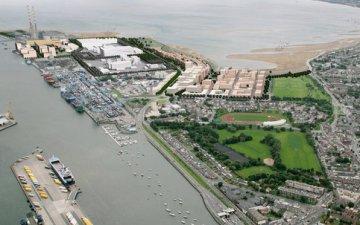Ministers must carry the can for Dublin Docklands fiasco

On November 4, 2004, the late Tony Gregory asked the then minister for the environment and local government, Dick Roche, whether there were any conflicts of interest which would inhibit the Dublin Docklands Development Authority (DDDA) from making balanced planning decisions in the Docklands area.
Roche replied with the familiar palaver about the experience and expertise of the board members and, while conflicts of interest were inevitable given the small pool of people with business experience and expertise here, the authority had adopted a formal code of conduct involving procedures to be followed in the event of a conflict of interests and that would ensure that everything was OK.
Gregory pointed out that this executive board was effectively the planning authority for the Docklands area. Some board members, including chairman Lar Bradshaw, were associated with Anglo Irish Bank, which was then funding the largest development in the whole north Docklands, a development to which they, as board members, had granted the planning permission in the first place.
He asked: what course of action would the board’s code of conduct provide when these same developers made new planning applications and came to the DDDA board looking for planning permission?
Roche replied with more familiar palaver. He said planning decisions were taken by the executive board of the DDDA. They had regard to the assessment and to the recommendations of the professional staff.
Possible conflicts of interest would inevitably arise from time to time but, if Gregory was suggesting that they had behaved with impropriety, then that was a very serious allegation.
Gregory ended the exchange with the observation: ‘‘The minister will not answer the questions I have asked."
He had been prompted to put these questions to the relevant minister by local community representatives in the Docklands area, notably by Marie O’Reilly and Joe Maloney.
The communities in the North Wall, north port and East Wall areas had been objecting to the conduct of the DDDA for some time.
The reason for their then representations arose from one of the developments in the area, Spencer Dock Development Company, which had received a massive loan from Anglo Irish Bank, based on planning permission granted by the DDDA, on whose board were Lar Bradshaw and Sean FitzPatrick, then chairman of Anglo Irish Bank.
The other members of the board of the DDDA at the time and in 2006 included Angela Cavendish, property developer; Donall Curtin, a partner in the accountancy firm Byrne Curtin Kelly ; Declan McCourt, who was on the board of the Bank of Ireland; Mary Moylan, an assistant secretary in the Department of Environment and Local Government; Niamh O’Sullivan, Arup Consulting Engineers; and Joan O’Connor of Interactive Project Managers.
It was blindingly obvious that several board members had conflicts of interest and while there is evidence that when such conflicts arose they did not take part in board discussions, the very presence of such conflicts should have disbarred them from membership.
This is because the camaraderie that develops in such situations could have the potential to compromise even those board members who do not have conflicts of interests.
Now we find that, before they approved of the investment of €140 million in the Glass Bottle site in October 2006, to be funded by Anglo Irish Bank, they omitted getting any formal valuation of the site - they accepted the informal valuation that amounted eventually to an incredible €412 million. That was for a site now valued at about €60 million.
And it further emerges that Brian Cowen, as minister for finance, gave approval for an increase in the DDDA’s borrowing limits to permit it to make this investment, even though it was evident at the time that no proper valuation of the site had been undertaken. Furthermore, the manner in which the various parties were to fund the purchase of this site could result in the DDDA having to pay the full whack for the venture.
What was going on in the minds of Cowen and officials in the Department of Finance and in the Department of Environment and Local Government, to have permitted the DDDA board to engage in such massive property speculation?
When the Bill to establish the DDDA was introduced in the Dáil on January 27, 1996, Brendan Howlin, the then Minister for Environment and Local Government, said the purpose of the measure was to ‘‘secure the sustainable social and economic regeneration of the docklands area, the improvement of the physical environment and the continued development of financial services activities in the Custom House Docks area’’.
Howlin said: ‘‘The types of activities in which the new authority will be involved will be wide-ranging. For example, it will be able to develop land, carry out environmental improvement works and make provision for infrastructure. It will be able to promote the coordination of investment in the area and the development of an appropriate mix of housing’’.
But nowhere in the speech - or in the Act itself - is there any mention that the DDDA could engage in high-risk property speculation.
And yet Cowen approved of the plan to borrow huge amounts of money precisely for such a purpose. And we are asked to believe that it was Sean FitzPatrick and his pals who were alone to blame for the entire fiasco.
